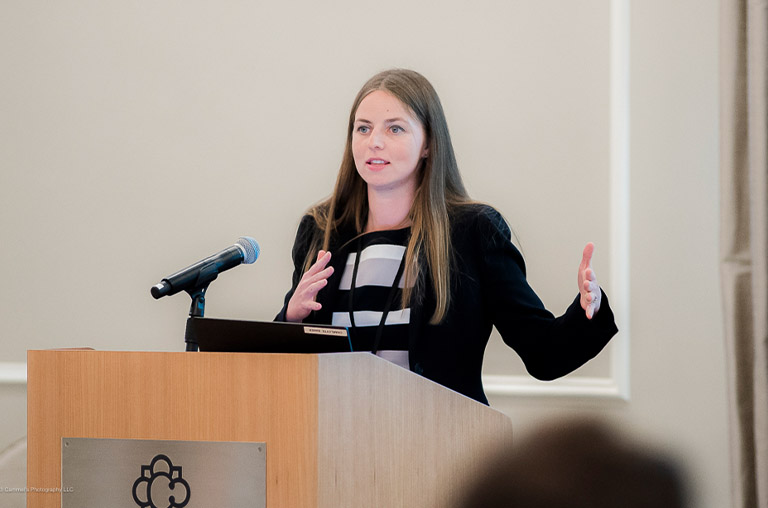Symposium underscores READDI’s role in ‘marathon of preparedness’
Drugs that broadly target virus families are essential when defending against Disease X, says blockbuster roster of speakers.

By READDI, September 27, 2023 — Imagine a scenario where COVID-19 had hit, but the world was ready with a medication that could stop it in its tracks. Making that scenario a reality was the focus of “Ready on Day 1,” a half-day symposium hosted by READDI, Inc., the Rapidly Emerging Antiviral Drug Development Initiative, in Chapel Hill, North Carolina, on Sept. 20.
A nonprofit organization, READDI leverages the latest virology know-how and medicinal chemistry to develop broad-acting small molecule antiviral therapeutics — pills that can be taken with a drink of water — to prevent severe illness, hospitalization and death. Critically, the company is doing so now, before the next novel virus emerges.
“It’s not about the sprint of response from the moment that we’re all panicking. It is about the marathon of preparedness before that day zero,” said speaker Charlotte Baker, deputy head of the London-based International Pandemic Preparedness Secretariat, or IPPS, which is affiliated with the G7 and is collaborating with READDI to help prepare for the next pandemic.
Baker, who arrived fresh from the United Nations General Assembly Science Summit, joined a blockbuster roster of experts who spoke about the urgency of preparedness and the importance of broad-spectrum therapeutics, READDI’s signature approach. They included former U.S. Senator Richard Burr and the Department of Defense’s Dr. Matt Hepburn, who was COVID Vaccine Lead for Operation Warp Speed.
“Ready on Day 1” drew a capacity crowd of nearly 100 attendees. It followed the annual scientific meeting of the Carolina-based READDI AViDD Center, one of nine Antiviral Drug Discovery (AViDD) Centers for Pathogens of Pandemic Concern around the U.S. funded by the National Institute of Allergy and Infectious Diseases.
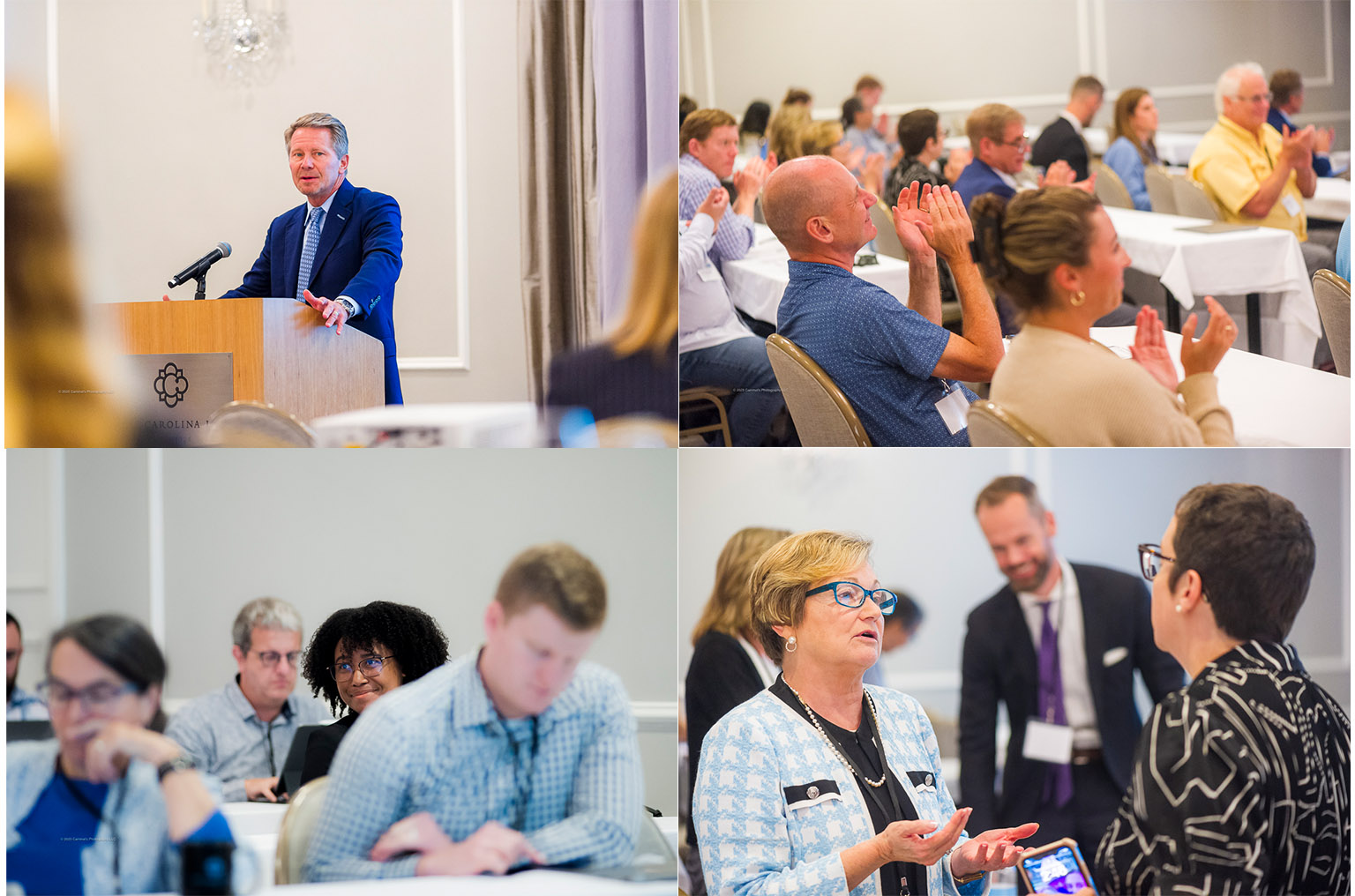
We see access to small molecule broad-spectrum antivirals as an absolutely essential component of this marathon of preparedness that we are running at the moment.”
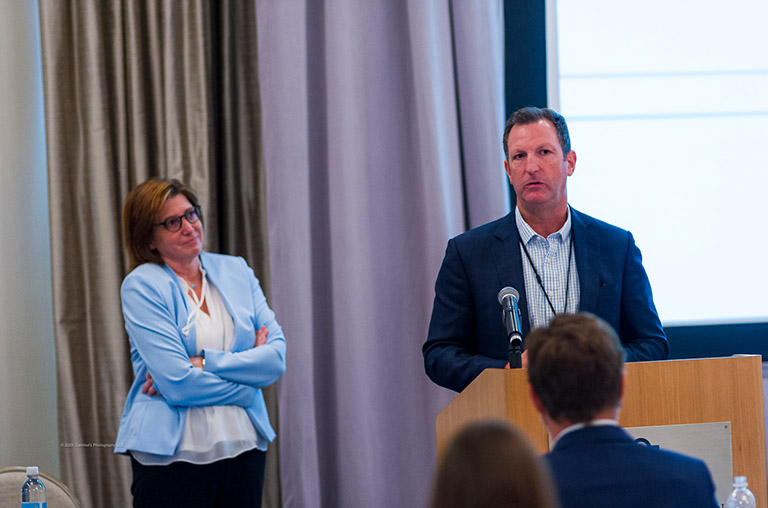
Targeting virus families
Following introductory remarks from UNC Chancellor Kevin Guskiewicz, READDI CEO Jimmy Rosen held up a deck of playing cards, a prop meant to drive home READDI’s innovative “broad-spectrum” antiviral approach. Drawing a card from the deck, Rosen asked audience members on one side of the room to silently guess the card’s number. Those on the other side needed only guess the suit.
“The suit is a heart,” Rosen said. “How many people on this side guessed it was a heart?”
Hands shot up.
Turning to face the other side of the room, he said, “OK, the card is a 30112X.”
No hands.
Like the next pandemic virus, card number 30112X does not yet exist, but the suit that it belongs to does.
“If this deck of cards represents viruses and each suit is a family of viruses, READDI is making drugs that work against the suits,” Rosen explained. “We have to be ready with drugs for every suit in the deck … because we don’t know what the next virus is going to be.”
That’s how viral pandemics work; the specific source of the next outbreak is a mystery. Experts call it Disease X. “We have to accept that and use it as our design principle,” said Carolina virologist Nat Moorman, READDI co-founder and scientific adviser.
READDI’s design principle, Moorman said, takes advantage of the fact that viruses in a family share inherited traits that allow scientists to target vulnerabilities within families. READDI is developing antiviral drugs that work against an entire family of viruses — even viruses that have not yet emerged.
The drug discovery work for five top virus families of pandemic concern is well underway, Moorman demonstrated in his presentation. He detailed progress on two promising compounds, NZ-804 and CMX-521, targeting the coronavirus family, including SARS-CoV-2, which caused a global catastrophe, and potentially future coronaviruses that have not yet emerged.
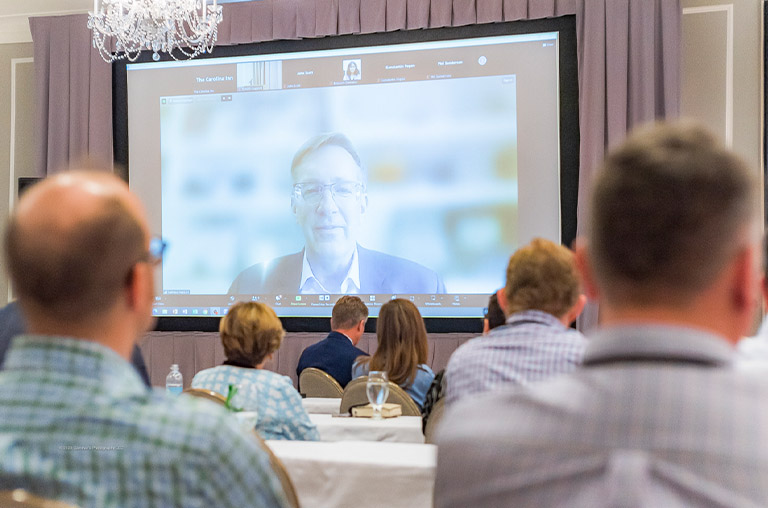
‘It’s not a miracle. It’s science.’
The catastrophic consequences of getting caught off guard by a novel virus, like SARS-CoV-2, was a recurring theme throughout the afternoon.
“We did not have therapeutics. We didn’t have vaccines. People were hiding in their houses,” said Gillings School of Global Public Health Dean Nancy Messonnier, who worked at the Centers for Disease Control and Prevention when the novel coronavirus emerged. She led the CDC’s COVID-19 vaccine implementation program.
Any understanding of coronaviruses and how to combat them was thanks to long-term commitments made by hardworking scientists, like READDI’s co-founders, she said. “There’s this public perception that drugs, vaccines and diagnostics miraculously appeared in our hands. … It’s not a miracle. It’s science.”
Messonnier said she pushes for “projects like READDI and the understanding that it is only these early investments that are going to put us in a better position in the next emergency.”
READDI and North Carolina
The DOD’s Matt Hepburn, who presented via Zoom from Washington, DC, has spent his public service career preparing for pandemics. He said he’s bullish on both READDI and the state of North Carolina.
Hepburn is chief medical officer for the Joint Program Executive Office for Chemical, Biological, Radiological and Nuclear Defense. During COVID-19, he led Operation Warp Speed, a public-private vaccine effort, and was part of an informal but influential group of seven advisers —collectively known as the “Wolverines” — chronicled in author Michael Lewis’ pandemic book, “The Premonition.”
“Without a doubt you’re on the cutting edge of scientific discovery here,” he said, referring to READDI. The challenge is accelerating that discovery into drug development.
There are “pockets in the country where you have this really nice mashup of scientific discovery, venture capital, product development, manufacturing, clinical trials and facilities,” Hepburn said. “Those mashups are how we’re going to revolutionize human health in the 21st century. The state of North Carolina has that mashup, and you, [READDI], are the manifestation of that mashup. … It’s all there in North Carolina. The challenge is to make it real.”
If anyone understands the urgency of making pandemic preparedness real, it’s Lee Lilley, North Carolina’s director of economic and pandemic recovery in the Office of the Governor, who is still digging out from the wreckage of COVID-19. Lilley spoke about how quickly a public health emergency on the Covid scale becomes an economic emergency.
“Anytime you see the kind of shock to the system that we had for the global economy … the reverberations are felt by everyone,” Lilley said. “We saw commerce come to a stop in many places.”
The solution? Trillions of dollars in funds funneled through states like North Carolina from the federal government. But relief money is limited. “The quicker we’re able to come up with antiviral responses to these types of pandemics,” Lilley said, the quicker we can get on “sound footing to get the economy going again.”
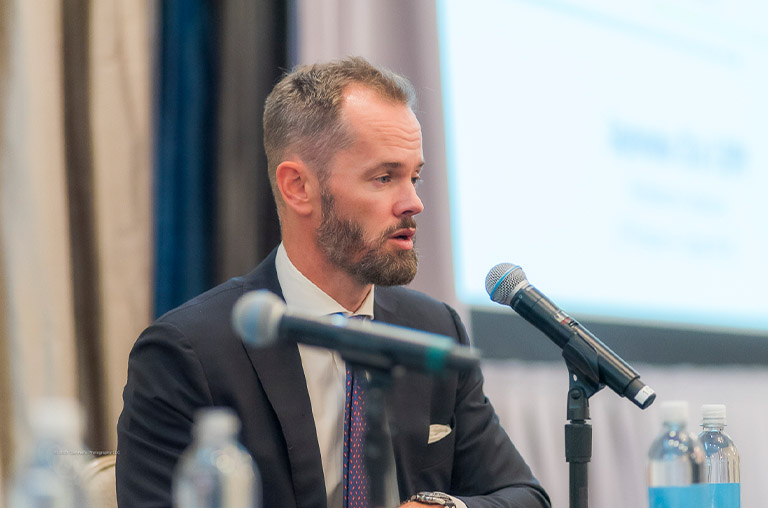
National, global perspectives
Burr, who joined READDI’s board of directors soon after leaving the Senate, spoke about crafting and sponsoring the nation’s original law protecting public health during man-made and natural disasters — the 2006 Pandemic and All Hazards Preparedness Act.
Initially a response to bioterrorism — specifically anthrax attacks in 2001 — PAHPA, as the law is known, evolved to address threats of naturally occurring viral outbreaks. Since its passing, there have been many such outbreaks, including SARS and MERS (both from the coronavirus family), H1N1 (an orthomyxovirus), Ebola (a filovirus) and Zika (a flavivirus).
“PAHPA was the framework that allowed all the responses by all federal agencies to the pandemic,” Burr said. “PAHPA allowed a vaccine to be created in 12 months. Without PAHPA, there’s no way it would have happened, regardless of how quickly we innovated.”
The Covid vaccines were hugely effective against SARS-CoV-2 and its related mutations, but the need to keep the life-saving vials cold posed huge challenges. “When you talk about what READDI’s doing, you eliminate all that,” Burr said. “Shelf life from a standpoint of production of countermeasures and storage of countermeasures is absolutely crucial. Oral medications not only give you stability in storage, [they] give you versatility in production.”
The IPPS’s Baker is a big proponent of oral medications — the kind of small molecule antivirals READDI is developing — because they can be shipped and stored without refrigeration wherever they are needed, including developing countries in Africa, Southeast Asia and Latin America.
“Broad-spectrum small molecule antivirals that are easy to administer and, crucially, cheap to manufacture so that they’re affordable have the potential to be a game changer for equity,” she said.
Baker explained her organization’s focus on the 100 Days Mission, a plan endorsed by the G7 and G20 countries to make diagnostics, therapeutics and vaccines available within 100 days of a pandemic outbreak. Had they been available during Covid, “millions of lives and trillions of dollars would have been saved and health systems would have come under considerably less strain,” she said.
Once the Covid response began, vaccines received the “overwhelming majority of attention from policymakers and the public,” she said. For the sake of equity and effectiveness, the IPPS would like to see more investment in therapeutics. “We see access to broad-spectrum small molecule antivirals as an absolutely essential component of this marathon of preparedness that we are running at the moment.”
